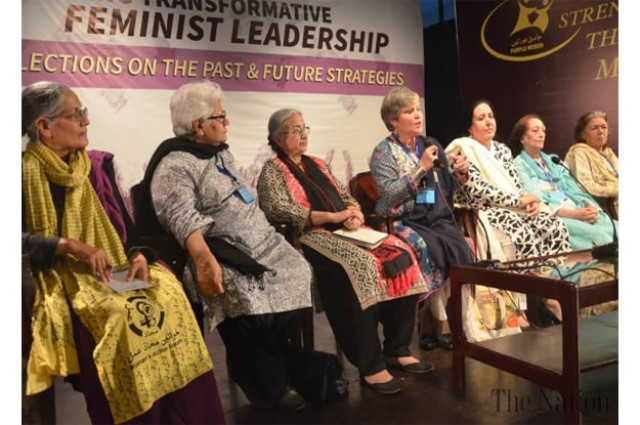Equitable clout: Join political parties for empowerment, women told
Achievements a cause for celebration but hard work must continue, say activists

Achievements a cause for celebration but hard work must continue, say activists. PHOTO: www.shirkatgah.org
“Women need to realise that meaningful change can be attained through influencing legislation and policies. We need to access the house where laws are debated and enacted,” said politician Mehnaz Rafi. She urged women to join political parties of their choice. She said political space in the country had been captured by capitalists to serve their own interests. “Socially and economically marginalised groups have been pushed out of politics,” she said.
Rafi lamented that none of the mainstream political parties had taken a stance against indirect election on seats reserved for women at local-, provincial- and national levels.
She was speaking at a panel discussion on The Need for a Feminist Movement/Collective Identity: Way Forward at Shirkatgah’s Convention on Building Transformative Feminist Leadership.
The three-day convention has been arranged as part of Shirkatgah’s Women’s Empowerment and Leadership Development for Democratisation Programme. There were more than 125 women politicians and activists from all over the country including the Jamni Auratien – a team of grassroots activists so described on account of the purple dupatta worn by them.
Awami National Party (ANP) leader Bushra Gohar shared her experience of striving for greater representation of women in the ANP and the Parliament. She said women’s struggle was not restricted to the political sphere. “One must be prepared to fight the odds at home, in the party as well as in other public spaces,” she said. “These are necessary if we are to bring about meaningful change in the society,” she said.
Gohar said she and other women activists in the ANP had succeeded in reforming the party’s constitution as well as changing the mindset of other members. “We have attained 50 per cent representation of women on leadership positions within the party,” she said.
Pakistan Peoples Party leader Bushra Aitezaz said that over the past couple of decades there had been visible progress in the country in terms of establishment of institutions like the National Commission for the Status of Women and enactment of women-friendly laws and policies. However, she said effective implementation of these laws was still lacking. “Let’s not wait for the government to implement these laws. Women should take a stand at all available fora on issues that concern them. In our struggle, we must benefit from official policies and state institutions” she said.
Woman Action Forum’s Nausheen Ahmed seconded Aitezaz’s suggestion. She urged women activists to forge alliances with like-minded groups to expand the women’s movement in the country.
“There are lessons to be learnt from successful movements like the lawyers’ movement. There was no stopping the movement once lawyers were joined in their struggle by a wide spectrum of social groups and organisations including trade unions, minority and women’s rights groups and civil society organisations.
Rights activist Tahira Abdullah raised the issue of growing misogyny in the society. She said the achievements of women’s struggle ought to be celebrated but the activists should also ponder upon the causes of rising misogyny in the society and come up with ways to tackle it.
Abdullah also lamented the targeted killing of activists in the recent years. “Too many good people like Parween Rehman, Sabeen Mahmud and Rashid Rehman have become targets of a campaign of hate. They were killed for speaking up against oppression,” she said.
Shirkatgah executive director Farida Shaheed, who chaired the discussion, praised the grassroots activism of Jamni Auratein. She said the activist’s resolve for building a feminist movement in their communities was commendable.
“The Zia years were horrific in terms of suppression of religious minorities, women and trade union activists. We have learnt our lessons and we know very well that our struggle is political. We need concerted efforts to take it forward.”
Published in The Express Tribune, November 22nd, 2015.



















COMMENTS
Comments are moderated and generally will be posted if they are on-topic and not abusive.
For more information, please see our Comments FAQ